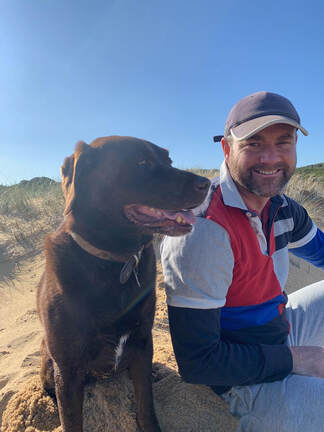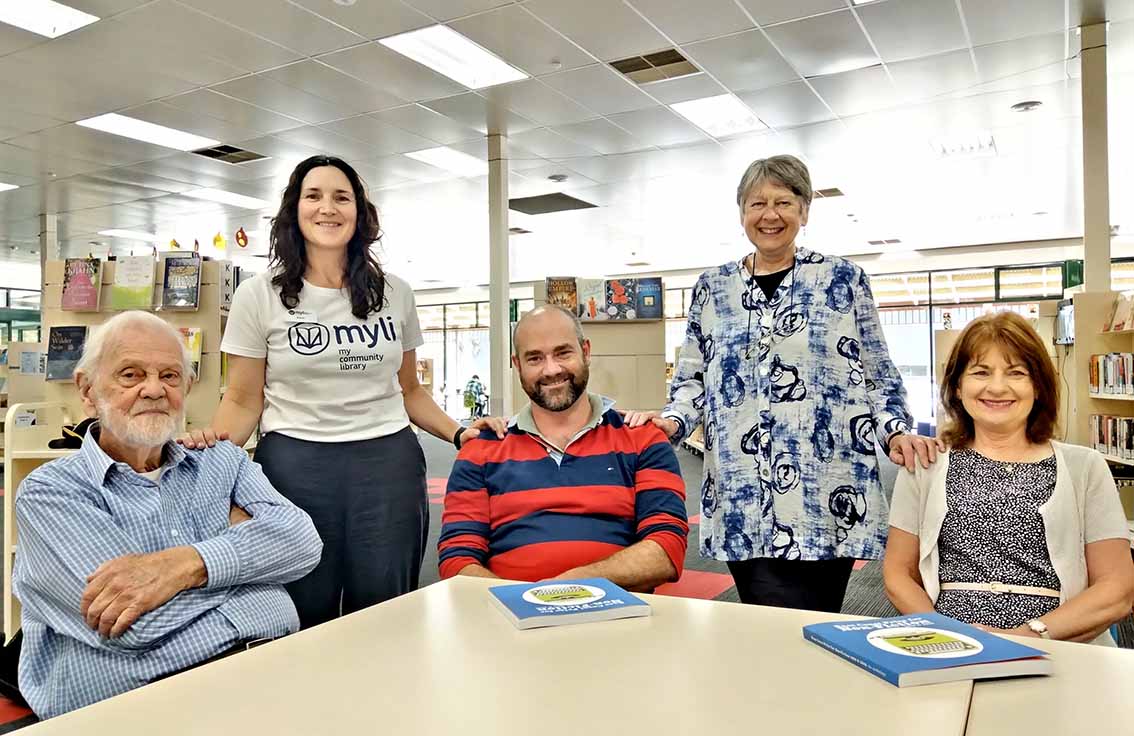 es Quilford with Nahla, who often joined him on his daily winter swims.
es Quilford with Nahla, who often joined him on his daily winter swims. By Catherine Watson
CAPE Paterson writer Rees Quilford has won the 2021 Bass Coast Prize for Non-Fiction with an evocative essay documenting his experience of returning to live in Bass Coast, the place of his birth and childhood.
Adrift in shallow waters outlines his attempt to reacquaint himself with the place through a daily routine of swimming, walking and photography at Cape Paterson’s Bay Beach through the first Covid winter.
A PhD candidate with the non/fiction Lab of the School of Media and Communication at RMIT University, Rees wins $5000 for his essay.
He said the prize was a valuable and financially significant prompt to inspire local creativity, reflection and storytelling.
CAPE Paterson writer Rees Quilford has won the 2021 Bass Coast Prize for Non-Fiction with an evocative essay documenting his experience of returning to live in Bass Coast, the place of his birth and childhood.
Adrift in shallow waters outlines his attempt to reacquaint himself with the place through a daily routine of swimming, walking and photography at Cape Paterson’s Bay Beach through the first Covid winter.
A PhD candidate with the non/fiction Lab of the School of Media and Communication at RMIT University, Rees wins $5000 for his essay.
He said the prize was a valuable and financially significant prompt to inspire local creativity, reflection and storytelling.
“It provides much needed encouragement of and recognition for non-fiction writing. I’m honoured to be recognised by it.
“Articulating the personal and intricate connections that we share with the special places in our lives is a highly rewarding endeavour. However, sharing those reflections in public is quite daunting so it was heartening to learn that the Bass Coast literary community found something engaging in my writing.”
“Articulating the personal and intricate connections that we share with the special places in our lives is a highly rewarding endeavour. However, sharing those reflections in public is quite daunting so it was heartening to learn that the Bass Coast literary community found something engaging in my writing.”
| The Bass Coast Prize is one of the richest prizes for short non-fiction in Australia, with a total of $10,000 in prize money. This year’s prize was sponsored by the Bass Coast Shire Council, West Gippsland Regional Library Corporation and ArtSpace Wonthaggi. Foster writer Graeme Wheeler, aged 93, won second prize with The Snow Girls, an account of the search for two young women missing in the high country in the 1960s. The story was based on his own involvement in the search, conversations and diaries kept by 'the snow girls' themselves. Graeme first write the story soon after the events described and was prompted to revisit it when he learned of the Bass Coast Prize. He said he spent many happy hours on his writing. "At my age, there isn't much future, so your attention turns to the past." Inverloch writer Judy Vradenburg won third prize with Wallace Avenue Community Park, a fly-on-the-wall account of community activism to save a local park from being sold and developed. Leongatha writer Leonie Margetts was highly commended for Saved by Martha, a moving essay about dealing with grief. Garfield writer Roman Kulkewycz was commended Rescue at the Bridge, his vivid account of a bad flood and a brave rescue Forty-two entries were submitted for this year’s competition. Entries came from most parts of Gippsland and there was a good range of ages, from the 20s to the 90s. Judges, Geoff Ellis, Anne Heath Mennell and Karen Bateman were impressed with the level of interest in writing about Gippsland, the talent displayed by so many writers and their courage in putting their work “out there”. The gender balance improved this year with 18 of the writers being male, including three of the five shortlisted entries. (There were just eight entries by men last year.) Personal and family memoirs were well represented as well as local history, natural history, military histories, an artist profile, travel and true crime. Subjects were just as varied with accounts of a successful community project, running, recovering from a traffic accident, bullying in the workplace, rescues from floods and snowstorms, Japanese war brides, discovering a forever home and finding a way through grief and loss. Naturally, the pandemic still loomed large this year. Several entries were concerned with discovering or rediscovering one’s neighbourhood, finding solace at home or in the garden or undertaking purposeful activities such as daily ocean swimming. Prize-winning and commended entries will be published in the Bass Coast Post over the coming months, starting with Rees Quilford's Adrift in shallow waters. | JUDGES’ COMMENTS Rees Quilford: Adrift in shallow waters “An elegiac, yet purposeful act of documentation and personal reflection, it links history, science, literature, and myth by well-chosen and referenced quotes. It is a grounded portrait of place and chronicle of time. It weaves between the past and present of both the town and the writer in a reflective (yet never self-indulgent) manner, always coming back to the source, the ocean. Subjective and introspective but thoughtfully linked to the wider world, it offers perspective in an uncertain time. “As the writer concludes, the work is ‘not just documentation for the sake of posterity, but an act that attempts to capture an exceptionally significant nexus of historical, contemporary, and natural forces’." Graeme Wheeler: The Snow Girls “There is a real sense of time and place contained within the language and narrative of this story. It is a very considered style, both in sentence composition and use of terminology. It is deceivingly simple, the writing is clean yet layered with imagery reminiscent of both the tone and expression of the era. “There are some wonderful descriptions of the landscape and some very telling details ... The country and country people are evoked, especially the cattlemen who are the heroes of the tale. The well sustained drama and tension hold the reader as the outcome remains unclear.” Judy Vradenburg: Wallace Avenue Community Park “There is a lovely flow to the writing, so much history in one small spot in Inverloch. It ties together community, politics, history, future planning and volunteers and is a fascinating story of dedicated community action. … It is a story which engages and informs and with a happy ending which makes this a rare gem in the annals of local activism. “ Leonie Margetts: Saved by Martha “A lovely story about grief and the processes that people use to traverse it. It has a good opening line and an ending which made one judge smile.” Roman Kulkewycz: Rescue at the Bridge “It feels like we are eavesdropping on a couple of farmers chatting. The narrative is very matter of fact and practical, the language modest and undecorated. The rising tension, combined with some insight into the characters, build a well-developed essay.” |
